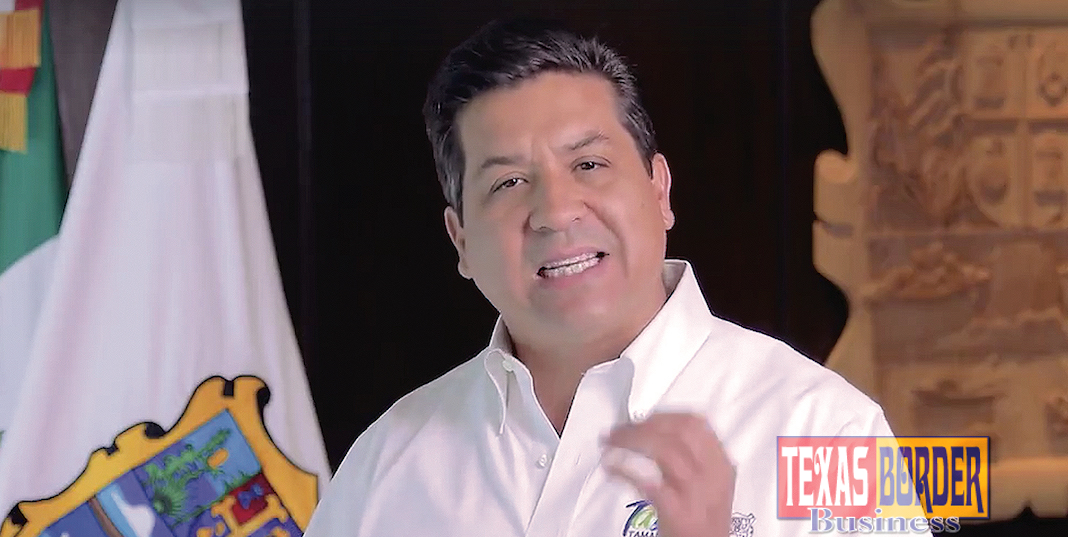
By Roberto Hugo Gonzalez
As originally published by Texas Border Business newsprint edition June 2017
Francisco J. Garcia Cabeza de Vaca, the new governor of Tamaulipas as of approximately eight months ago, has been fighting crime even before he was elected. First as Mexico’s senator for the state Tamaulipas and then as a candidate for governor.
The governor even visited Mission about eight months ago, about thirty days before taking office. He met with Beto Salinas, Mission Mayor, and Jim Darling, McAllen Mayor during an event hosted by the McAllen-Hidalgo and Mission Anzalduas International Bridges.
During a press conference, he shared his plans to fight crime. He mentioned that Congressman Henry Cuellar had assisted in introducing him to the main people at the US Embassy in Mexico and last September he toured Washington where he met with the White House executive team under the Obama administration. All these activities were an active effort on his part to look for support and to show his genuine interest to eradicate crime in his state of Tamaulipas.
“Is he for real?”, this reporter asked Congressman Cuellar. “I’ve known Francisco since he was a senator, ever since, he has been talking about doing what he is doing now,” Cuellar stated.
Francisco Cabeza de Vaca, first governor not to be affiliated with the PRI since 1933, took office October 1, 2016, only to corroborate first-hand what he already knew about former state officials and organized crime.
Just recently, the governor streamed a video where he said, “For the last seven months since I started this new government, our priority has been to fight crime.” He continued, “The situation left by the past state governments, irresponsible and colluded with delinquency, is more regrettable than we had imagined.”
The governor has his work cut out for him. The history is that every time you eliminate one criminal another one comes into place. It’s a vicious cycle; nevertheless, the efforts in the process are imperative.
He said that former state administrations had agreements with the criminals, and they weakened the state’s public security institutions. He found out that from more than 9,000 public safety police officers that are required in the state of Tamaulipas, there are only 2,000 currently. He pointed out that most of them without the proper training, equipment, or sufficient weaponry to fight criminals.
The surveillance camera network was found broken, the General Attorney’s office abandoned and left with no technology needed to fight criminals. “I understand the prevalent citizens’ mistrust about its function,” the governor said.
The other big problem he found is a poor administration of prisons where crimes were being directed to take place both inside and outside and the prison. Just a few days ago, the new state authorities found three tunnels in the Reynosa prison; also, weapons were found in an area dedicated to a garden. The facility which was built to hold 1,400 inmates, at one time hosted 5,000.
One of his many concerns, the governor has plans to transform the operational model to have secure, functional and adequate prisons. For that to happen, he has started with the transfer of prisoners from several prisons to end the control of certain individuals that lead organized crime.
Governor Cabeza de Vaca also said that he would strengthen their relationship with the Federal Government and the Armed Forces to stop the criminal leaders and to dismantle the financial structure, which allows them to keep on recruiting criminals. He calls his plan “Implementation of an Integral Strategy to reestablish the social network, recovering the public areas under the control of offenders, and rescuing the lost generations taken by the criminal element.
Despite not having the appropriate resources, Cabeza de Vaca has imprisoned evil lawyers working for organized crime groups. Drug cartel leaders have fallen as well as members of different criminal bands dedicated to kidnapping, extortion, and robbing. The work does not stop there. He has ordered the closing of sports betting casinos and entities promoting prostitution of minors.
Under his responsibility, he took over the traffic department (transito) in Reynosa to support the local mayor supervising work and law enforcement. He said, “We can´t allow the existence of hundreds of pirate cabs which are part of the prevailing insecurity.
He has also asked the Federal Government to strengthen their presence in Tamaulipas especially the Department of intelligence which helps fight against federal offenses such as the smuggling of goods, weapons, fighting theft of fuel and electricity, and deals with immigrants and any other activities that are a source of income to the organized crime.
“We must understand that these delinquents do not compete for honor or pride nor the control over a (plaza), they are disputing a loot which comes from every illegal activity. That´s why I´m asking to strengthen and to close all avenues of the criminal’s income,” he stated.
Cabeza de Vaca wants peace in his state to reestablish the order and the rule of law. He said, “It’s a struggle that takes determination and commitment.” He continued, “We are moving on with what we have, and according to our possibilities we started to dismantle kidnapping and extortion bands which are a part of the same criminal groups that commit common crimes.”
The governor said that he is aware of the violent crimes committed in the state, and concludes that the residents elected him to reestablish peace and the rule of law.
“I´m not going to stop moving forward, but at the same time I have demanded the local authorities and the municipal mayors to fight hard against crime.” He said, “Who doesn´t want to fulfill (carry out their obligation) then step aside.”
He also pointed out that under his tenure, he will not ignore what is happening, and there will be no cover ups for anyone. “After almost a quarter of a century when most of those who ruled our destiny delivered our future to organized crime, today we are affecting criminals and corrupt interests,” he stated.
Cabeza de Vaca said that he plans to recover what has been taken from every citizen in the state and that is peace and security, but above all their freedom. “Our children deserve a better future, this fight is for them,” he stated.
It is important to say that the 43 cities of the state of Tamaulipas have no active police departments because they are under the Single Command State Police. In a way, they were abolished due to corrupt police officers that sided with criminals; in most cases, they were the criminals.
A little bit of history to understand how a city operates without a police department. On October 6, 2010, former President Felipe Calderón submitted to Congress a constitutional reform bill to establish a single, unified Single Command State Police to create and strengthen powerful and efficient police corporations.
On February 6, 2013, the Mexican state of Morelos became the first state to implement a centralized “single command” state police force, in a test case for the security reforms of new President Enrique Peña Nieto.
On April 11, 2013, 43 city police departments were abolished in the state of Tamaulipas, right after the official Constitutional Reform Proposal was approved to establish a Single Command State Police.
With that in mind, the Mexican Government promoted a major revamping of the institutional framework of police forces across the country. The objective was to establish better command, control and communication with police forces at the state level, to achieve more competent and trustworthy policing to ensure public safety throughout the country.
Therefore, this reform proposal seeks to establish greater coordination between police agencies. It set up standardized selection and recruitment systems, stricter vetting controls, as well as incentives and promotions benefits throughout the country; to restore citizens’ confidence in their authorities; and, ensure the safeguarding of human and civil rights, the full exercise of individual freedoms, and the protection of citizens’ property.
According to this reform, every state will have a police force under the direct command of the Governor, who will appoint a state Chief of Police or Director General, resulting in 32 heads of police around the country.
State police forces will be responsible for public safety. While seeking to prevent violence and crimes, they will also improve their capacity to respond to emergencies swiftly and investigate crimes.
This initiative also considers the possibility to maintain municipal police forces, if they meet rigorous vetting, training, and other operational criteria. Municipal police forces that respond to these requirements will continue to be under the control and direction of the Governor, who will appoint a local director at the recommendation of each Mayor. In case they do not meet the required standards, the municipal police will be under the control of the state police -under the command of the Governor- who will be ultimately responsible for guaranteeing public security in the municipalities.
The training of a state police of Tamaulipas, as Governor Cabeza de Vaca envisions, is in the process. In the meantime, he has the support of the Marines, the Army, and the Mexican Federal Police. TBB
Written by Roberto Hugo Gonzalez, 2009 SBA Journalist of the Year and 2009 & 2012 Paul Harris Award recipient.













